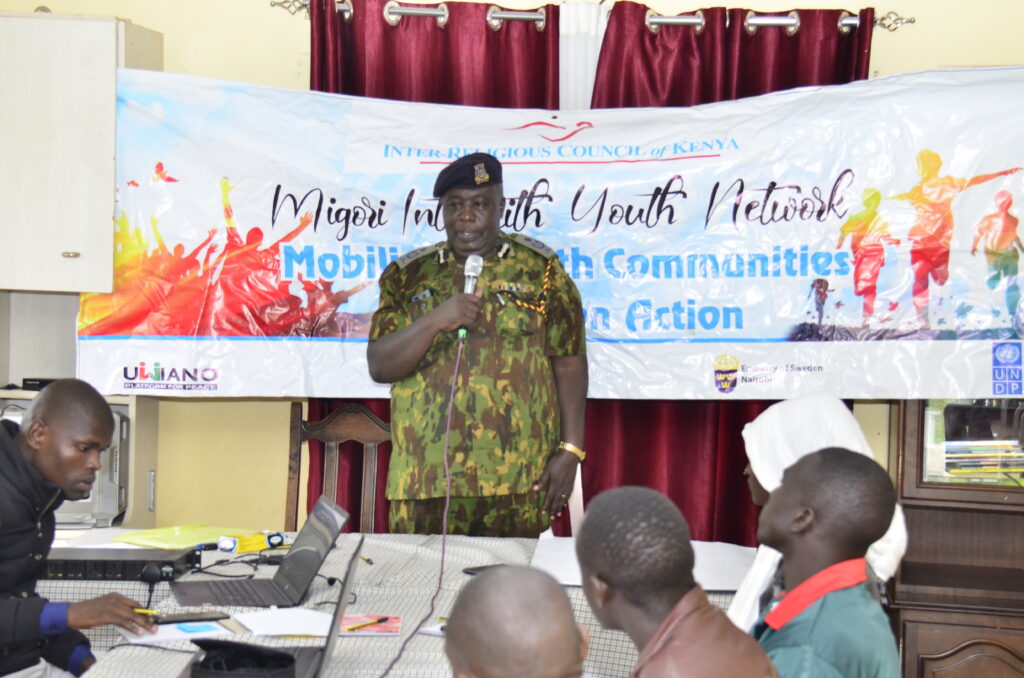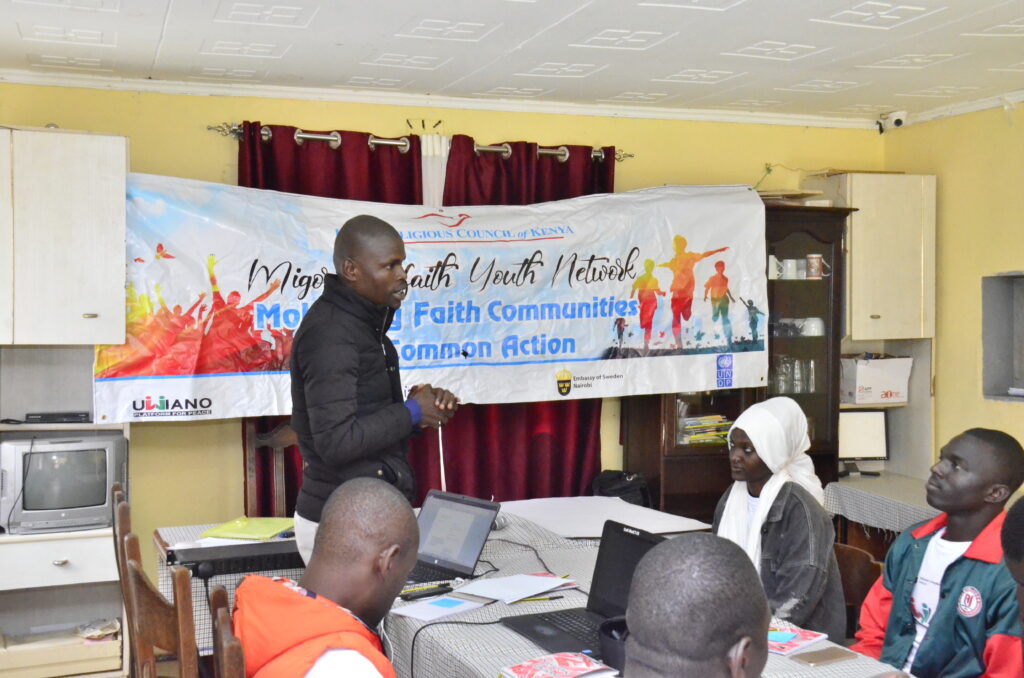By MN Reporter
When the Inter-Religious Council of Kenya (IRCK) extended its youth chapter to Migori County, several youths were lost in the shackles of despairs.
The majority of youths have been at the focal point of violence, theft, drinking spree and drug substance abuse, among other non-productive activities.
Migori County has for a long time, been ranked among the front-runner counties regarded as a hot spot zone for violence, especially during the electioneering period, with its youth playing roles in it.
In one of its bids to bring harmony, peace and tranquillity among the youth who have far mostly been affected by political temperatures, the IRCK intervened by extending its youth wing to the county to engage youths during, before and after the 2022 elections.
Dabbed Migori Interfaith Youth Network, under the IRCK umbrella, brought together youths from different religious backgrounds with a common goal of changing the negative brand that youths in Migori county bear.
IRCK is a coalition of all major faith communities in Kenya that works together to deepen inter-faith dialogue and collaboration among members for a common endeavour to mobilise the unique moral and social resources of religious people and address shared concerns
The body embarked on, offering training and giving different approach perspectives to the youthful generation while restoring their hope of being productive people in society.
Tragedies that befall the young population have seen an increase in mental illnesses such as depression, hopelessness, non-productivity and rising crime rates associated with youths.
Although the government has come up with various initiatives to address youth agendas, especially on employment, much is still needed to save the generation from long-lost hope.
Initiatives such as Ajira digital, Uwezo funds, KYEOP and Kazi Mtaani are other programmes aimed at uplifting the slowly dying generation with no hope in life. Nevertheless, the intervention has borne minimum fruits as frustrations over beaurocracy.
However, in Migori a dimming light of hope has steadily risen for the youths when IRCK launched a youth chapter in the county in July 2022.
Bring youths together to work on a common goal of restoring strayed hope was given priority, while focusing on building a peaceful correlation with society.
Among the activities given top priority was ball game competitions, community service work which included volunteer cleaning of urban settlements and talent search competitions.
The rewards of such competitions included balls, uniforms and training kits, led to a formation of a junior football club in Oruba settlements within Migori town, an area which has been on the radar for its criminal activities.
Rodger Otieno, a youth coach of the new Balaina FC, said that it is through the activities, that they managed to form a club from among themselves.
Otieno states that they have had desires to form a football club, but due to a lack of equipment and a common platform to bring the youth together, it has never been easy.
“In my area, we have a new football club called Balaina Fc, it is only through the youth network that we managed to get together. Initially, youths would come and go because we did not even have a single ball for training,” he said.
Otieno adds that the youths in the area were scared of converging together as they would be seen a security threat. The intervention of the interfaith youth network has helped in achieving their common interest.
The interfaith youth network has also given the youth a sense of responsibility through which they conducted communal service by cleaning the streets of Migori town and its surroundings.
Through such initiatives, more youths were recruited in the drive which incorporated the local administration headed by Migori County police commander Mr Mark Wanjalla.

Mr Wanjalla noted that when they got an invitation to join youths in an activity in Migori town, he was curious to know what agenda they had. This after having recently engaged his officers in cat-and-mouse games.
“I was curious to know what the youth had this time. The Migori youth I knew was not the one that could invite the police for communal service,” remarked Wanjalla.
“However, I was pleased with how organised they were and how peaceful they conducted themselves with ease. I admit it was one of the best moments in my job.” He added.
The commander added that they also took the opportunity to engage the youth in sensitization talks on the importance of maintaining peace, especially during the election period.
He added that taking part in youth activities has helped bridge the gaps between the security and the youth which has enhanced information sharing from the community.
Wanjalla notes that it was through such initiatives that Peaceful elections were experienced for the first time in the county.
In addition, county security has been making press releases from time to time using local media to encourage the youth on the importance of maintaining peace. This also included holding open Barraza’s coordinated by chiefs to sensitise every member of the society on the disadvantages of disharmony created through political intolerance.
Although, the commander slammed politicians for having hands in manipulating youths by predetermining the possibility of violence even when there is no sign of disharmony.
He encouraged youths to be honest in their deeds and also to report any harassment subjected to them by the police unlawfully.
The IRCK intervention through the interfaith youth network has also provided a platform for exposure to the youth through seminars, which allows them to meet different people and have a new perspective on life approaches.
“When Covid 19 broke out, I lost my job with the NGO I was working with. I had no skills apart from my professional training. Life hit hard,” recounts Austin Okello, chair of the Migori interfaith youth network.
“I could not find food for my family, nor could I pay rent which was mounting. I almost sunk into depression as I often could be seen speaking to myself,” he added.
Instances, where unemployment has resulted in depression, leads to hopelessness in life, have been on the rise among the Kenyan youth population.
Kenyan youth live below the poverty level, despite enduring hardships while seeking education to get better jobs. The worst of all, losing the job that is the sole anchor of survival
Okello recounts how meeting a young Somali age mate at one of their exposé, who owns a camel ranch in northern Kenya inspired him to start something.
He states that knowing the climatic condition of northern Kenya, it is difficult to keep livestock yet, there is a youth who is determined to beat the odds.
“During one of my seminars, I met a young Somali who inspired me with his camel ranch project. When I got back home, I promised to challenge myself and do something,” he recounts.
Currently, Okello has embarked on beekeeping and has ten beehives near his rural home in Cham gi Wadu village in Rongo Sub County.

Okello is also determined to start a poultry project for commercial purposes on top of his small stock of 50 chickens he has at his rental house in Migori town.
The IRCK has so far succeeded in bringing youths together for a common goal which is peace and tranquillity in the county.
In addition, the majority of the youth have found purpose in life and diverted their attention from depending on politicians and other non-productive activities.
Migori County IRCK coordinator Bishop Charles Otigo, states that he could not be more pleased by the small gains realised over a short period.
“As a church we always wanted the youth to be productive members of society, but this was not easy since the majority were lost in crime, drug substance abuse and also taken sides with politicians, who use them for their self-interest,” said the bishop.
He continued, “However, for the last six months, which include the election month, the intervention of interfaith youth network under IRCK has seen the narrative change. Youths are more charged to do the better good for themselves and the community.”
The revelation has been one of the greatest achievements among other missions they had. He notes that the majority of youths have come together, the promotion of peace has been at the centre stage of their engagements and the spirit of volunteering for community service has been breaded.
Concurrently, crime rates have drastically reduced as sanity is slowly but steadily crawling back into society.

